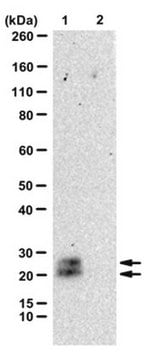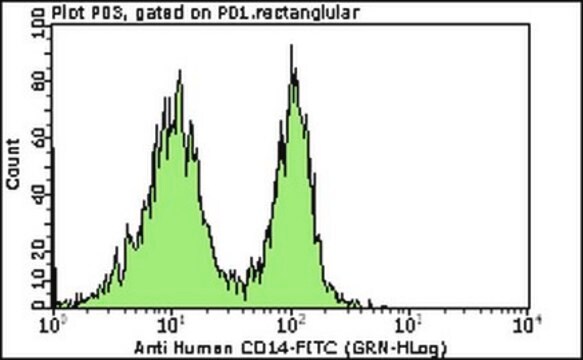推荐产品
生物源
mouse
品質等級
抗體表格
purified antibody
抗體產品種類
primary antibodies
無性繁殖
6F, monoclonal
物種活性
mouse, hamster, chicken, canine, rat, human, monkey
製造商/商標名
Upstate®
技術
electrophoretic mobility shift assay: suitable
immunohistochemistry: suitable
immunoprecipitation (IP): suitable
western blot: suitable
同型
IgG1
NCBI登錄號
UniProt登錄號
運輸包裝
dry ice
目標翻譯後修改
unmodified
基因資訊
human ... ZBTB33(10009)
特異性
Kaiso
免疫原
Recombinant N-terminal GST and His-tagged fusion protein corresponding to residues 103-584 of murine Kaiso
應用
Detect Kaiso with Anti-Kaiso Antibody, clone 6F (Mouse Monoclonal Antibody), that has been shown to work in EMSA, IP, WB & IHC.
Research Category
Epigenetics & Nuclear Function
Epigenetics & Nuclear Function
Research Sub Category
Transcription Factors
Transcription Factors
品質
Immunoblot Analysis: 0.5-2 μg/ml of this antibody detected Kaiso in RIPA lysates from 3T3/A31cells.
Immunohistochemistry: As shown by an independent laboratory, 1μg/ml of this antibody gave positive nuclear immunostaining for Kaiso in NIH 3T3 cells fixed with 100% methanol (Daniel, 2001; Daniel, 1999).
Immunoprecipitation: As shown by an independent laboratory, 2-5μg of this antibody immunoprecipitated Kaiso from RIPA lysates from NIH 3T3 cells (Daniel, 1999; Prokhortchouk, 2001).
Supershift: As shown by an independent laboratory, this antibody will supershift a specific methyl-CpG complex (Prokhortchouk, 2001).
Immunohistochemistry: As shown by an independent laboratory, 1μg/ml of this antibody gave positive nuclear immunostaining for Kaiso in NIH 3T3 cells fixed with 100% methanol (Daniel, 2001; Daniel, 1999).
Immunoprecipitation: As shown by an independent laboratory, 2-5μg of this antibody immunoprecipitated Kaiso from RIPA lysates from NIH 3T3 cells (Daniel, 1999; Prokhortchouk, 2001).
Supershift: As shown by an independent laboratory, this antibody will supershift a specific methyl-CpG complex (Prokhortchouk, 2001).
標靶描述
97kDa
外觀
Protein G Chromatography
0.07M Tris-glycine, pH 7.4, 0.105M NaCl, 0.035% sodium azide and 30% glycerol.
Format: Purified
儲存和穩定性
2 years at -20°C
分析報告
Control
Positive Antigen Control: Catalog #12-305, 3T3/A31 lysate. Add 2.5 μL of 2-mercapto-ethanol/100 μL of lysate and boil for 5 minutes to reduce the preparation. Load 20 μg of reduced lysate per lane for minigels.
Positive Antigen Control: Catalog #12-305, 3T3/A31 lysate. Add 2.5 μL of 2-mercapto-ethanol/100 μL of lysate and boil for 5 minutes to reduce the preparation. Load 20 μg of reduced lysate per lane for minigels.
法律資訊
UPSTATE is a registered trademark of Merck KGaA, Darmstadt, Germany
免責聲明
Unless otherwise stated in our catalog or other company documentation accompanying the product(s), our products are intended for research use only and are not to be used for any other purpose, which includes but is not limited to, unauthorized commercial uses, in vitro diagnostic uses, ex vivo or in vivo therapeutic uses or any type of consumption or application to humans or animals.
Not finding the right product?
Try our 产品选型工具.
儲存類別代碼
10 - Combustible liquids
水污染物質分類(WGK)
WGK 1
J M Daniel et al.
Hybridoma, 20(3), 159-166 (2001-07-20)
The POZ-zinc finger protein Kaiso belongs to a rapidly growing superfamily of BTB/POZ zinc finger transcription factors implicated in embryonic development and cancer. Kaiso interacts with the catenin p120(ctn), but the significance of the interaction remains unknown. Although p120(ctn) is
Shun-Dong Dai et al.
Cancer science, 102(1), 95-103 (2010-11-13)
δ-Catenin is the only member of the p120 catenin (p120ctn) subfamily that its primary expression is restricted to the brain. Since δ-catenin is upregulated in human lung cancer, the effects of δ-catenin overexpression in lung cancer still need to be
A Prokhortchouk et al.
Genes & development, 15(13), 1613-1618 (2001-07-11)
We describe a novel mammalian DNA binding activity that requires at least two symmetrically methylated CpG dinucleotides in its recognition sequence, preferably within the sequence 5'CGCG. A key component of the activity is Kaiso, a protein with POZ and zinc-finger
The catenin p120(ctn) interacts with Kaiso, a novel BTB/POZ domain zinc finger transcription factor.
J M Daniel et al.
Molecular and cellular biology, 19(5), 3614-3623 (1999-04-17)
p120(ctn) is an Armadillo repeat domain protein with structural similarity to the cell adhesion cofactors beta-catenin and plakoglobin. All three proteins interact directly with the cytoplasmic domain of the transmembrane cell adhesion molecule E-cadherin; beta-catenin and plakoglobin bind a carboxy-terminal
Shun-Dong Dai et al.
BMC cancer, 9, 178-178 (2009-06-11)
Kaiso has been identified as a new member of the POZ-zinc finger family of transcription factors that are implicated in development and cancer. Although controversy still exists, Kaiso is supposed to be involved in human cancer. However, there is limited
我们的科学家团队拥有各种研究领域经验,包括生命科学、材料科学、化学合成、色谱、分析及许多其他领域.
联系技术服务部门







